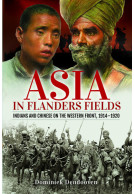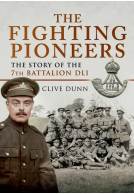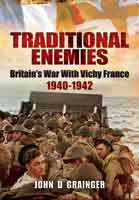The British West Indies Regiment (ePub)
Race and Colour on the Western Front
Imprint: Pen & Sword Military
File Size: 18.2 MB (.epub)
Pages: 208
Illustrations: 8 mono illustrations
ISBN: 9781399067713
Published: 4th October 2023
| Other formats available - Buy the Hardback and get the eBook for £1.99! | Price |
|---|---|
| The British West Indies Regiment Hardback Add to Basket | £20.00 |
This is a military-political history with a vital and all-pervading cultural and social theme which shapes the narrative - race, colour and prejudice. But despite this, there is an extraordinary underlying theme of empire loyalty among serving soldiers - NCOs and private soldiers - and a growing grasp of political ideas and liberal democracy. And the loyalty to the British crown as an agent of the ending of slavery will be amazing to some readers.
War experience was a powerful catalyst and contributed to a 'West Indianess' and desire for political advance. But even here the desire was for independence within the empire - a 'West Indian Dominion' as with 'elder sisters' of empire, the Dominions of Australia, Canada, New Zealand and South Africa.
The political and economic status of the islands was a potent reason for the 'coloured contingents' enlisting - work was scarce - but a major impetus was the cultural concept of 'manliness' and empire-status - shared by George V, who insisted, against government pressure, on allowing West Indians to serve with white British soldiers. But all were volunteers and not enlisted men.
The West Indies Regiment was small and its contribution in action limited, and restricted largely to Egypt and Mesopotamia, and with limited service on the Western Front. But it shows vividly the ingrained racialism and colour prejudice of British society and the British Army and above all, in the insensitive omission of the West Indies Regiment at the Victory Parade in 1919.
The author, a specialist historian of the First World War with a PhD from the University of Kent, will be well known as the Curator and Researcher at Flanders Fields Museum in Ypres and as a University Lecturer. The British West India Regiment was formed in October 1915 in response to the patriotic fervour expressed by the West Indians and the insistence of King George V who personally intervened and over-ruled British officialdom who presented all manner of reasons, it seems entirely based on skin colour and racial prejudice, why contrary to The Manual of Military Law, they should be forbidden to serve with white British soldiers. By the end of the War almost 16,000 men from the West Indies had served in the ranks of twelve battalions. Most, some 66% came from Jamaica, and until August/September 1916 they only served overseas in Egypt and Palestine, due to it being considered unacceptable for “black troops” to fight white Europeans but by Autumn 1916 until the end of the War they mostly served in France, Flanders and Italy. Although many were trained as infantrymen they were officially designated noncombatants and in addition to guarding duties they mostly undertook a vast range of labouring tasks to satisfy the ever growing demand for labour to support the War in France and Flanders. They acquitted themselves well and, mostly through shelling, suffered almost 1,400 fatalities, almost 10% of the total who served. Over 700 died in France and Flanders, over 200 in Egypt, Mesopotamia, 160 in Malta and Italy and the balance in the UK probably mostly due to the influenza pandemic at the end of the War. At the end of the War the West Indians received the same campaign medals as their British comrades, and some were decorated for bravery, but there is no doubt that they were subjected to extremes of ingrained racial and colour prejudice and were not treated at all well. As a final and disgraceful mark of prejudice and insult to their loyalty the West Indian troops were excluded from the Victory Parade in London in 1919. The author’s frank and comprehensive analysis of the disgraceful treatment the fiercely loyal subjects of the West Indies suffered at the hands of the British establishment and military hierarchy makes for very uncomfortable reading in the twenty first century but, partly as a consequence, it is an enlightening and compelling read. Not so much a regimental history but more a social, political and military assessment which clearly shows how the experiences of West Indians during the First World War ultimately led to a desire for greater self-determination and eventually independence. Highly recommended.
Military Historical Society - August MHS Bulletin 2024
Review as featured in
Gun Mart Magazine
Highlight: 'This sad but poignant history is well told and reveals an all-but-forgotten chapter of WWI'
The British West India Regiment was formed in October 1915 in response to the patriotic fervour expressed by the West Indians and the insistence of King George V who personally intervened and over-ruled British officialdom who presented all manner of reasons, it seems entirely based on skin colour and racial prejudice, why contrary to The Manual of Military Law, they should be forbidden to serve with white British soldiers. By the end of the War almost 16,000 men from the West Indies had served in the ranks of twelve battalions. Most, some 66% came from Jamaica, and until August/September 1916 they only served overseas in Egypt and Palestine, due to it being considered unacceptable for “black troops” to fight white Europeans but by Autumn 1916 until the end of the War they mostly served in France, Flanders and Italy. Although many were trained as infantrymen they were officially designated non-combatants and in addition to guarding duties they mostly undertook a vast range of labouring tasks to satisfy the ever growing demand for labour to support the War in France and Flanders. They acquitted themselves well and, mostly through shelling, suffered almost 1,400 fatalities, almost 10% of the total who served. Over 700 died in France and Flanders, over 200 in Egypt, Mesopotamia, 160 in Malta and Italy and the balance in the UK probably mostly due to the influenza pandemic at the end of the War.
Brig (Retd) Clive Elderton CBE - Chairman The Military Historical Society
At the end of the War the West Indians received the same campaign medals as their British comrades, and some were decorated for bravery, but there is no doubt that they were subjected to extremes of ingrained racial and colour prejudice and were not treated at all well. As a final and disgraceful mark of prejudice and insult to their loyalty the West Indian troops were excluded from the Victory Parade in London in 1919. The author’s frank and comprehensive analysis of the disgraceful treatment the fiercely loyal subjects of the West Indies suffered at the hands of the British establishment and military hierarchy makes for very uncomfortable reading in the twenty first century but, partly as a consequence, it is an enlightening and compelling read. Not so much a regimental history but more a social, political and military assessment which clearly shows how the experiences of West Indians during the First World War ultimately led to a desire for greater self-determination and eventually independence. Highly recommended.
Article: 'Caribbean war heroes who fought for Britain - only to face racism and execution'
Daily Mirror
READ HERE: https://www.mirror.co.uk/news/uk-news/caribbean-war-heroes-who-fought-31097062?fbclid=IwAR0_UYvxTOpy6Qu_ktABN2KUEPjnXJNkwmClH6dc6I90lCY6PSPpP6mWhVY
About Dominiek Dendooven
Dominiek Dendooven is an historian of the First World War and brings a unique 'European' perspective to the study of the lived experiences and writings of West Indians who served with the Allies, the 'Entente Powers'. This is a 'European' view from a researcher and author, outside the dominant British imperial view, underpinned by the British imperial hegemony of the period. This is not to say that UK, Commonwealth - Canadian, Australian and Caribbean historians are encumbered by British imperial baggage, but here is a scholar with 'local' connections to the First World War in Europe and even with descendants of some who served. He is on the staff the In Flanders Fields Museum as Curator and Researcher and is Associate Lecturer and Researcher at the Universities of Antwerp and Louvain. His PhD is from the University of Kent where he still works with Professor Mark Connelly, Head of the School of History and Director of Gateways to the First World War (AHRC funded). Dominiek Dendooven has published over 10 works in English and French.
















